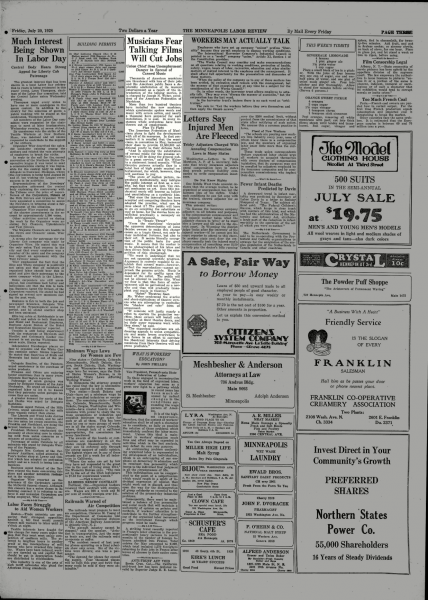| Artifact Type | Labor Newspapers, Sources |
| Publication | Minneapolis Labor Review |
| Number | X106 |
| Page Number | 3 |
| Place | Minneapolis, MN |
| Publication Date | July 20, 1928 |
| Transcript | Show/Hide |
|
Headline: “Musicians Fear Talking Films Will Cut Jobs” Subhead: Union Chief Sees Unemployment Danger in Spread of Canned Music Thousands of American musicians are threatened with loss of their jobs and the American public faces a deplorable adulteration of its musical entertainment as a result of the introduction of the talking movies, it is charged by Joseph N. Weber, president of the American Federation of Musicians. More than two hundred theatres have installed the new machines, which synchronize spoken words and music with screen action, and nearly a thousand have prepared for such installation, it is said. In many instances whole orchestras have bene thrown out of employment. Plan To FightThe American Federation of Musicians plans to fight the development with all of its resources. In that connection it is recalled that the musicans, in convention in May, increased their dues to provide $1,500,000 additional yearly to their defense fund. “And in opposing the substitution of canned music for the genuine article we will be doing the general public a great service,” said Mr. Weber in a statement issued recently. “What threatre [sic] patrons actually face is a total loss of high grade musical entertainment, for which, however, they will continue to pay. “The score of motion picture, reproduced mechanically, may intriguie the public interest at first as a novelty, but that will not last. You cannot mechanize an art. Soon this mechanical music will become as hollow and unsatisfying as a synthetic kiss. “But once the innovation has been accepted and competing theatres have adopted the practic, what can be done about it? The public will have to go on accepting the substitute or stay at home, for the movies have established practically a monopoly on public entertainment. Is “Tragic Threat”“From the musicians’ viewpoint the apparent determination of some theatre owners to make this change comes as a tragic threat, not only to their individual fortunes, but also to their art. It means literally corruption of the public taste for good music. It means that the worker is to be photographed at his labor and then driven from his job by the competition of this photograph. “We want it understood that we are not opposing scientific progress. Argument is scarcely required to establish that canned music—however, perfect the reproduction—cannot approach the genuine article. Music is dependent for its quality upon the mood of the artist. The public will not be allowed to realize this. What we fear is that this form of entertainment will be patronized as a novelty and thus will gradually transplant real music in theatres.” “Robot” Theatres SeenMr. Weber condemned the avarice and short-sightedness of theatre owners who are attempting to capitalize the “shadow and echo” form of amusement. “If someone will justly supply a robot to operate the projection machine, these owners will install coin turnstiles at their theatre doors, and let their queer museums work while they sleep,” he said. “The organized musicians are addressing appeals to union sympathizers and music lovers everywhere to join forces in an effort to convince the theatrical interests that driving musicians from their theatres will not prove profitable.” |
|
| Archive | Labor Review Archive Project |
| Read In Context | http://www.minneapolisunions.org/labor_review_archive_about.php |
| Citation | “Musicians Fear Talking Films Will Cut Jobs,” Minneapolis Labor Review, July 20, 1928. |
| Tags | 1920s1928July 1928 |
